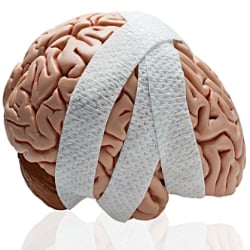
Could it be a concussion? How to tell
7 November 2013
Sports and concussions can sometimes go hand-in-hand. Each year there seem to be more headlines about the seriousness of head injuries and demands for safer sports regulations. Is this an over-reaction or should we all pay more attention? How easy is it to get a concussion while just “horsing around’? The Trauma Centre at The Montreal Children’s Hospital (MCH) of the McGill University Health Centre (MUHC) have answers to these questions.
What is a concussion?
A concussion is a type of brain injury that causes a disturbance in brain function. It can be caused by a direct blow to the head, face, neck or body. It is important to note that while wearing protective headgear is always encouraged for safe play, it may not always prevent concussions. “Helmets, when worn properly, can reduce the incidence of severe brain injuries, but do not completely shield the brain,” says Debbie Friedman, Trauma Director at the MCH. “The brain is mobile within the skull. It can move from one side to the other during a hit or fall, causing a brain injury.” Friedman goes on to say that each year the MCH treats at least 1000 children and teens who have sustained sports related concussions.
Is it a concussion? A concussion should be suspected in the presence of any of the following: Signs observed
- Confused/disoriented, does not know: time, place, activity,opposing team, or score of the game;
- Cannot remember what happened before, during and/or after the injury;
- A brief loss of consciousness (knocked out);
- Easily distracted, difficulty with concentration;
- Not playing as well;
- Slurred speech;
- Slow to answer questions or follow directions;
- Strange or inappropriate emotions (i.e. laughing, crying, getting angry easily);
- Blank stare / glassy-eyed.
Symptoms reported
- Headache
- Nausea
- Dizziness
- Vomiting
- Feeling dazed, “dinged” or foggy
- Seeing stars or flashing lights
- Ringing in the ears
- Drowsiness
- Double or blurry vision
- Poor coordination/impaired balance
- Memory problems
The MCH recommends these prevention tips:
- Wear appropriate standardized protective equipment. Make sure it fits.
- Wearing a helmet decreases the severity of brain injuries but it does not make you invincible.
- Physical preparation, proper conditioning and skill training is fundamental.
- Fair play which includes teamwork, sportsmanship, respecting the rules and zero tolerance to violence is essential.
- Consider environmental factors such as the condition of playing fields, ice surfaces, and other sports venues.
Remember a concussion is a brain injury:
- Recognize symptoms
- Seek medical attention
- Never play through an injury
Reviewed by Trauma specialists at the Montreal Children’s Hospital.
Last updated: January 2014, October 2015
